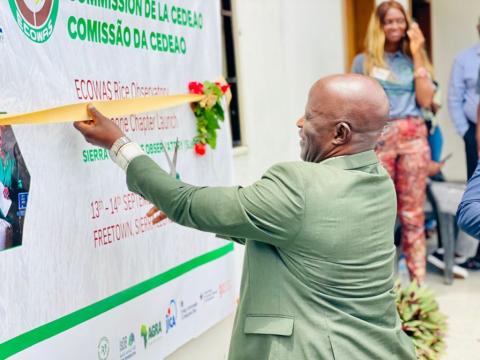By Nasratu Kargbo
The ECOWAS Rice Observatory (ERO) has launched the Sierra Leone Chapter. The move according to Deputy Minister 2 of Agriculture Sahr Hemore is to actualize President Julius Maada Bio’s ‘Feed Salone’ agenda.
The ERO chapter of Sierra Leone: Sierra Leone Rice Observatory (SLeRO) was launched on the 14th of September 2023 at a rice stakeholder meeting in Freetown.
“I note, with interest, that an observatory is supposed to systematically observe, record, analyze, and, very importantly, take programmatic action on the observations, recordings, and analyses. I venture to take it that the ECOWAS Rice Observatory, Sierra Leone Chapter, will have similar functions” Hemore said.
The Minister said they are working towards ensuring the president’s aim of using agriculture to transform the country to a middle-level income status is actualized.
Hemore said he believes that the country can be rice sufficient, recalling a statement GIZ’s Country Director to Sierra Leone, Christian Widmann made at the launch of the National Regional Working Group Sessions for the formation of the National Chapter of ECOWAS Rice Observatory in Sierra Leone "If all stakeholders in the country work together to stem import and drive a robust domestic production and processing of rice, it will be of great benefit for Sierra Leone and its people", he noted.
He stated that in order to achieve rice sufficiency, the country has to use a multi-sectoral approach to achieving the ‘Feed Salone’ agenda, highlighting the essence of sectors such as Water Resources, Energy, Health, Rural Development, and Meteorological Agency amongst others.
He entreated all that in the process of implementation, they should make sure they feed the country with cost-effective and nutritious rice, highlighting the improvement of other areas such as the school- feeding programme, improving the lives of farmers, and providing employment amongst others.
Speaking via Zoom, Team Lead for the Rice Project at German International Cooperation (GIZ) Move Florian Winckler said establishing the national chapter was necessary, stating it will be responsible for informing the priorities of their countries at regional level.
He said the government and its predecessors have been trying to ensure that they reduce rice importation and increase the level of productivity. He added that the programme is set on cutting the importation of rice annually, cutting down the number of people that are directly affected by hunger, creating jobs as a response to unemployment, and strengthening the overall shocks that it could face.
Winckler said that private and public sectors should collaborate to achieve rice sufficiency. He assured the country that his institution would continue to support the country in order to meet its objective.
Representing ERO virtually through Zoom, Dr. Boladale Adebowale said rice is not only a priority crop but also a political crop in West Africa. She stated that creating the institution is timely and relevant to the country.
She said one of the challenges faced in member states is that demands outweigh supply from domestic production, which has led to the massive importation of rice from Asia and other areas. Adebowale stated that in 2020 over eight million tons of milled rice was imported by West Africa, which amounts to over 3.4 billion dollars, saying that it undermines the indigenous capabilities in the production of rice and development of the value chain.
Adebowale noted that the above is the reason ECOWAS wants to make its members state rice sufficient.
ECOWAS Rice Observatory is a private-public sector sustainable consultative platform that was established to create the enabling environment to facilitate investment flows across ECOWAS into the rice value chain.
Copyright © 2023 Politico (15/09/23)








